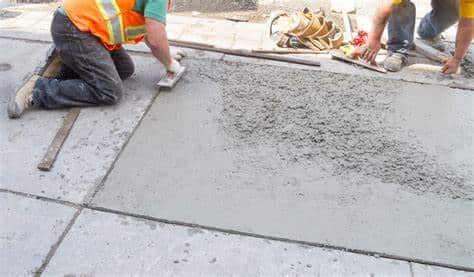Why Concrete Withstands High Temperature In Coronado?
 Concrete is renowned for its durability and strength, making it a popular choice for construction projects ranging from buildings to bridges. One of its remarkable properties is its ability to withstand high temperatures. Here are five reasons why concrete can endure extreme heat:
Concrete is renowned for its durability and strength, making it a popular choice for construction projects ranging from buildings to bridges. One of its remarkable properties is its ability to withstand high temperatures. Here are five reasons why concrete can endure extreme heat:
- Concrete possesses high thermal mass, meaning it can absorb and store heat effectively. When exposed to high temperatures, concrete gradually absorbs the heat, preventing rapid temperature fluctuations. This characteristic helps in maintaining a stable internal temperature within structures, reducing the risk of thermal stress and damage.
- Compared to other building materials like metal, concrete has relatively low thermal conductivity. This property inhibits the rapid transfer of heat through the material, providing insulation against high temperatures. As a result, concrete structures are less susceptible to heat penetration and can maintain their structural integrity even in intense heat environments.
- The chemical composition of concrete contributes significantly to its ability to withstand high temperatures. The primary components of concrete include cement, aggregates (such as sand and gravel), and water. When exposed to heat, these components undergo complex chemical reactions, forming stable compounds that enhance the material’s strength and resistance to thermal degradation.
- Concrete undergoes a hydration process during curing, where water reacts with cement to form a crystalline structure known as calcium silicate hydrate (C-S-H). This structure provides concrete with its strength and durability. Additionally, the hydration process continues over time, even at elevated temperatures, resulting in the formation of additional hydration products that further reinforce the concrete matrix against heat-induced damage.
- The choice of aggregates used in concrete mixtures can also influence its ability to withstand high temperatures. Aggregates with high thermal resistance, such as crushed granite or quartz, contribute to the overall heat resistance of concrete. By carefully selecting appropriate aggregates, engineers can tailor concrete mixtures to meet specific performance requirements in high-temperature environments.
FAQs
Can All Types Of Concrete Withstand High Temperatures Equally?
No, the ability of concrete to withstand high temperatures can vary depending on factors such as the composition of the concrete mixture, the curing process, and the quality of aggregates used. Specialty concretes designed for high-temperature applications typically incorporate additives and reinforcements to enhance heat resistance.
Are There Any Limitations To The Temperature Range That Concrete Can Withstand?
While concrete can endure relatively high temperatures, extreme heat beyond certain thresholds can still cause thermal expansion and potential damage. Additionally, prolonged exposure to high temperatures may degrade the concrete over time. Engineers must consider these factors when designing structures for environments with extreme heat conditions.
How Does Fireproofing Concrete Differ From Standard Concrete Construction?
Fireproofing concrete involves incorporating additional measures such as fire-retardant additives or applying fire-resistant coatings to enhance its ability to withstand high temperatures and prevent structural failure during fire incidents. These measures provide an extra layer of protection against heat exposure and minimize the risk of fire-related damage.
Conclusion
Concrete’s ability to withstand high temperatures is attributed to its thermal mass, low thermal conductivity, chemical composition, hydration process, and aggregate selection. Understanding these properties is crucial for engineers and builders when designing structures for environments with elevated temperatures. While concrete offers significant heat resistance, careful consideration of factors such as concrete composition, construction techniques, and fireproofing measures is essential to ensure the long-term durability and safety of concrete structures in high-temperature conditions. For more information, contact Concrete Contractor Coronado at (619) 304-9897.